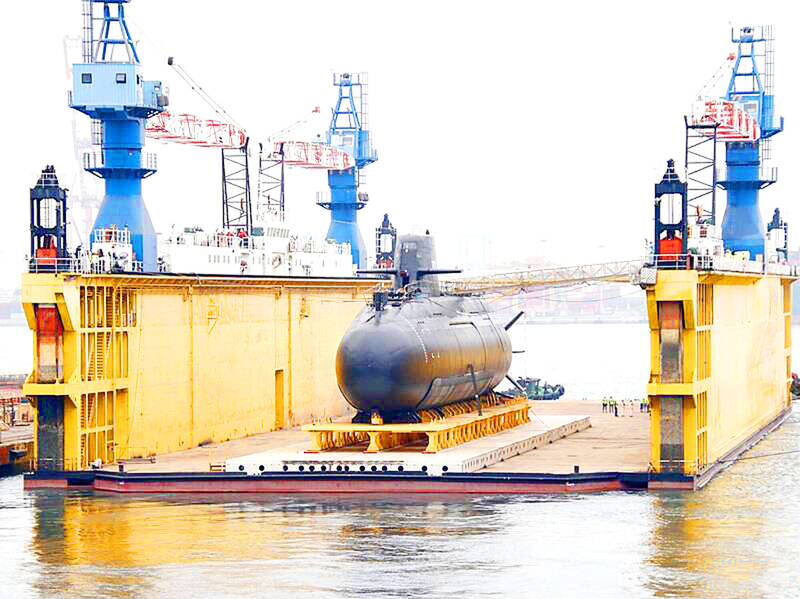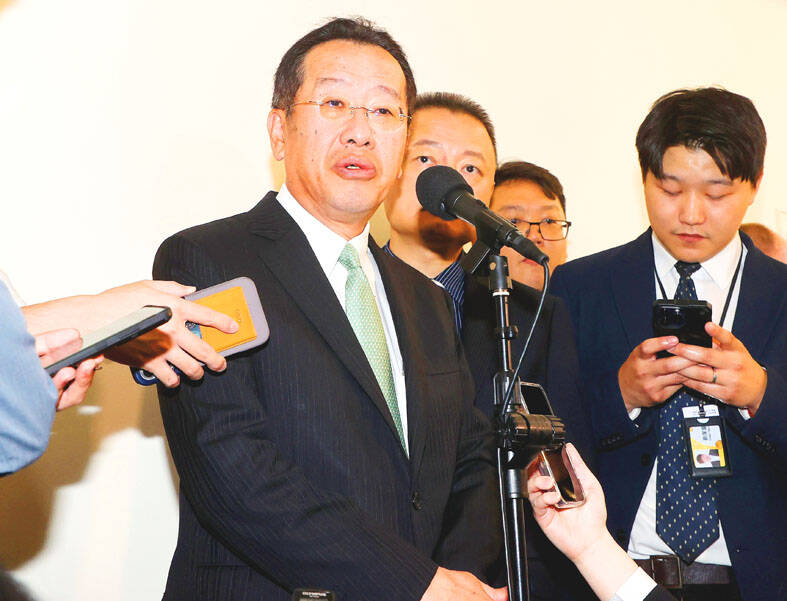The harbor acceptance test (HAT) for the Hai Kun (海鯤), or “Narwhal,” an indigenous defense submarine (IDS) prototype, is nearly complete and the vessel is expected to be delivered to the navy before the end of next year as scheduled, the navy said yesterday.
The HAT for the IDS prototype is 83 to 85 percent complete, Republic of China Navy Chief of Staff Vice Admiral Chiu Chun-jung (邱俊榮) told a meeting of the legislature’s Foreign Affairs and National Defense Committee.
This would be followed by a sea acceptance test (SAT), which is expected to begin in April next year and conclude by October before the vessel is delivered in November, Chiu said, adding that the testing process is on time and on schedule.

Photo: Lee Hui-chou, Taipei Times
Taiwan’s first domestically built submarine prototype was unveiled in Kaohsiung in September last year at a ceremony presided over by then-president Tsai Ing-wen (蔡英文). The prototype began HAT in October last year and has been going through the final stages of the process since Feb. 27.
The IDS project is part of a proposal by the military to build seven submarines from next year to 2038 at an estimated cost of NT$284 billion (US$8.74 billion), which was approved by the Cabinet on Aug. 30. The budget proposal still needs to clear the Legislative Yuan.
For next fiscal year, the Ministry of National Defense has budgeted approximately NT$1.996 billion for the production of new submarines.

Photo: CNA
Minister of National Defense Wellington Koo (顧立雄) said that the government would not spend a dime on construction plans for new submarines until the Hai Kun prototype passes its sea acceptance test, but that not allocating a budget this year might affect the progress of the construction plan.
Koo made the remarks in response to media queries for comment after Chinese Nationalist Party (KMT) Legislator Hsu Chiao-hsin (徐巧芯) said that she would propose slashing the budget by NT$1.796 billion, while fellow KMT legislators Huang Ren (黃仁) and Ma Wen-jun (馬文君) said they would propose eliminating the entire budget.
If the fund is budgeted this year, the navy can quickly use it to build new submarines if the Hai Kun passes its sea acceptance test next year, Koo said.
“If the budget is not compiled this year, but compiled after the SAT is passed, it might make it to the budget preparation deadline in August next year. The budget for submarines would thus not be compiled until the year after next. The entire schedule for subsequent submarines would be delayed as a result,” Koo said.
Koo pledged that the budget plan would be compiled based on the testing results of the prototype submarine, and the ministry would submit the plan to the Legislative Yuan for review.
KMT Legislator Chen Yeong-kang (陳永康) said he believed that it is not the budget that affects the submarine-building schedule, but CSBC Corp, Taiwan’s (台船公司) unclear shipbuilding schedule.
Workers, schedules and facilities that are involved in shipbuilding are not isolated issues, and the government cannot budget funds ahead of time without knowing whether the schedule and quality of the submarines match expectations, he said.
The ministry has not disclosed details of submarine contracts and export license conditions either, he said.
The first and second phases of domestic submarine production began in 2016 and lasted for eight years, but the funding for the third phase needs to be budgeted all the way until 2038, Hsu said.
She suggested re-evaluating the whole process by separating the budget items into “2 + 3 + 2” as stages for the indigenous submarine building program, adding that this would enable a more efficient use of the defense ministry’s budget.
Democratic Progressive Party Legislator Wang Ting-yu (王定宇), coconvener of the Foreign Affairs and National Defense Committee, said that the ministry’s budget plan of close to NT$2 billion is not high in proportion to the total fiscal budget.
“The budget plan to facilitate progress on this path to safeguarding the security of our nation,” he said.
Taiwan People’s Party (TPP) Legislator Lin Yi-chun (林憶君) said she would opt to “freeze” instead of cutting the budget.
As the prototype is still undergoing testing, she said she would propose freezing the budget by half.
TPP caucus whip Huang Kuo-chang (黃國昌) said that the party has always believed that Taiwan should bolster its national defense, adding that it would support a military procurement budget that is necessary and meets national needs.
“However, the testing of the first prototype submarine has not been completed. Without testing results, nobody knows if the first ship would be a success. The responsible approach is to compile the budget according to the construction schedule,” Huang said.
Additional reporting by Chen Yu-fu

AIR SUPPORT: The Ministry of National Defense thanked the US for the delivery, adding that it was an indicator of the White House’s commitment to the Taiwan Relations Act Deputy Minister of National Defense Po Horng-huei (柏鴻輝) and Representative to the US Alexander Yui on Friday attended a delivery ceremony for the first of Taiwan’s long-awaited 66 F-16C/D Block 70 jets at a Lockheed Martin Corp factory in Greenville, South Carolina. “We are so proud to be the global home of the F-16 and to support Taiwan’s air defense capabilities,” US Representative William Timmons wrote on X, alongside a photograph of Taiwanese and US officials at the event. The F-16C/D Block 70 jets Taiwan ordered have the same capabilities as aircraft that had been upgraded to F-16Vs. The batch of Lockheed Martin

GRIDLOCK: The National Fire Agency’s Special Search and Rescue team is on standby to travel to the countries to help out with the rescue effort A powerful earthquake rocked Myanmar and neighboring Thailand yesterday, killing at least three people in Bangkok and burying dozens when a high-rise building under construction collapsed. Footage shared on social media from Myanmar’s second-largest city showed widespread destruction, raising fears that many were trapped under the rubble or killed. The magnitude 7.7 earthquake, with an epicenter near Mandalay in Myanmar, struck at midday and was followed by a strong magnitude 6.4 aftershock. The extent of death, injury and destruction — especially in Myanmar, which is embroiled in a civil war and where information is tightly controlled at the best of times —

China's military today said it began joint army, navy and rocket force exercises around Taiwan to "serve as a stern warning and powerful deterrent against Taiwanese independence," calling President William Lai (賴清德) a "parasite." The exercises come after Lai called Beijing a "foreign hostile force" last month. More than 10 Chinese military ships approached close to Taiwan's 24 nautical mile (44.4km) contiguous zone this morning and Taiwan sent its own warships to respond, two senior Taiwanese officials said. Taiwan has not yet detected any live fire by the Chinese military so far, one of the officials said. The drills took place after US Secretary

THUGGISH BEHAVIOR: Encouraging people to report independence supporters is another intimidation tactic that threatens cross-strait peace, the state department said China setting up an online system for reporting “Taiwanese independence” advocates is an “irresponsible and reprehensible” act, a US government spokesperson said on Friday. “China’s call for private individuals to report on alleged ‘persecution or suppression’ by supposed ‘Taiwan independence henchmen and accomplices’ is irresponsible and reprehensible,” an unnamed US Department of State spokesperson told the Central News Agency in an e-mail. The move is part of Beijing’s “intimidation campaign” against Taiwan and its supporters, and is “threatening free speech around the world, destabilizing the Indo-Pacific region, and deliberately eroding the cross-strait status quo,” the spokesperson said. The Chinese Communist Party’s “threats